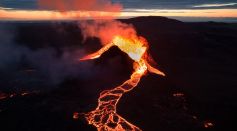ENVIRONMENT & CLIMATE
Caldor Fire: Satellite Captures Stunning Time-Lapse of the California Fire Near Lake Tahoe

Watch Tardigrades Walk on Microscopic Level; Water Bear Movements Surprisingly Familiar in Astonishing Video
Microorganisms Hidden in Passion Fruit Seeds Found Beneficial Rather Than Harmful; New Study Reveals Bacteria’s Help in Germination, Growth, and Defense
KNUCKLES’ Role in Flower Clock; This Tiny Multi-Functional Protein Helps Complete Floral Development Properly at the Right Time
Grisly Remains of First Farmers in Atacama Reveal Brutal Challenges To Live in Driest Nonpolar Desert
Genetic Analysis Uncovers Unexpected Evolution Flexibility of Bowfin Fish; Presents Better Model for Human Evolution

Stone Soup for a Sustainable World: Life-Changing Stories of Young Heroes by Marianne Larned [Book Review]

Unearthing Romance: 1,500-Year-Old Skeletons in China's Shanxi Province Buried Locked in Embrace During Northern Wei Era
Lack of Natural Predators Turns Overly Poisonous Cane Toads Into Cannibals, Become Invasive Species

Volcanoes Provide Earth's Atmosphere First Oxygen 100 Million Years Earlier Than Great Oxidation Event

Perfect Shape of Eggs and Its Universal Equation Identified for the First Time; Geometrical Feature Applicable to Food Industry and Other Scientific Disciplines
Dead Whale Being Feasted on by Great White Sharks Captured on Video; Watch Footage of the Cape Cod Occurrence
Fukutoku-Okanoba Eruption: NASA Shares Incredible Satellite Images of Japan’s Underwater Volcano From 80 Feet Underneath the Surface
Fire Island Reef: Expanded, Stronger After 55-Foot Steel Luxury Vessel Sank Purposefully
Most Popular

Microplastics Are Everywhere — How Plastic Pollution Threatens Wildlife, Soil, and Water

Brain Health Aging Guide: Effective Strategies for Cognitive Decline Prevention and Lower Dementia Risk

How Scientists Use Radio Telescopes to Search for Alien Signals Across the Universe

Mitochondrial Health and Aging: How Cell Energy Drives Modern Anti-Aging Science





